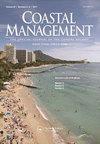The Coastal Zone Management Act in Its Sixth Decade: An Unsung Cornerstone in the Nation’s Response to Climate and Ocean Change
IF 1.9
4区 环境科学与生态学
Q4 ENVIRONMENTAL SCIENCES
引用次数: 0
Abstract
Abstract In 2022, the CZMA turned 50, joining other statutes from what has become known as the Environmental Decade in reaching this milestone. This essay, which the Journal presents in two issues, examines the Act’s role in addressing our coast’s most critical challenge—climate change. In the first issue and installment the essay briefly reviews the social and political context in which the Act emerged, lessons learned from other statutes’ 50th anniversary, and the CZMA’s 40th anniversary. The first installment then reviews the CZMA’s Section 309 program. This program encourages each participating state and territory to develop a 5-year strategy to enhance its Coastal Management Program (CMP) to address statutorily identified objectives, one of which most closely pertains to climate related impacts. The essay’s first installment concludes that the CZMA is singularly well positioned at a time when it is vitally needed, the prospect of new legislation is dim, and the current Supreme Court is methodically dismantling the environmental administrative state. The second installment reviews several individual 309 Strategies for 2021–2025 to illustrate how states and territories are using the CZMA to respond in the near term to climate change related impacts.《海岸带管理法》第六个十年:国家应对气候和海洋变化的未知基石
摘要2022年,CZMA年满50岁,与后来被称为“环境十年”的其他法规一起达到了这一里程碑。《华尔街日报》分两期发表了这篇文章,探讨了该法案在应对我们海岸最关键的挑战——气候变化方面的作用。在第一期和第二期中,文章简要回顾了该法案产生的社会和政治背景,从其他法规50周年和CZMA 40周年中吸取的教训。然后,第一部分审查了CZMA的第309条计划。该计划鼓励每个参与州和地区制定一项5年战略,以加强其海岸管理计划(CMP),以实现法定目标,其中一个目标与气候相关影响最为密切。这篇文章的第一部分得出的结论是,在迫切需要CZMA、新立法前景黯淡、现任最高法院正在有条不紊地解散环境行政国家的时候,CZMA处于非常有利的地位。第二部分回顾了2021-2025年的几个309战略,以说明各州和地区如何利用CZMA在短期内应对气候变化相关影响。
本文章由计算机程序翻译,如有差异,请以英文原文为准。
求助全文
约1分钟内获得全文
求助全文
来源期刊

Coastal Management
环境科学-环境科学
CiteScore
6.00
自引率
0.00%
发文量
24
审稿时长
>36 weeks
期刊介绍:
Coastal Management is an international peer-reviewed, applied research journal dedicated to exploring the technical, applied ecological, legal, political, social, and policy issues relating to the use of coastal and ocean resources and environments on a global scale. The journal presents timely information on management tools and techniques as well as recent findings from research and analysis that bear directly on management and policy. Findings must be grounded in the current peer reviewed literature and relevant studies. Articles must contain a clear and relevant management component. Preference is given to studies of interest to an international readership, but case studies are accepted if conclusions are derived from acceptable evaluative methods, reference to comparable cases, and related to peer reviewed studies.
 求助内容:
求助内容: 应助结果提醒方式:
应助结果提醒方式:


